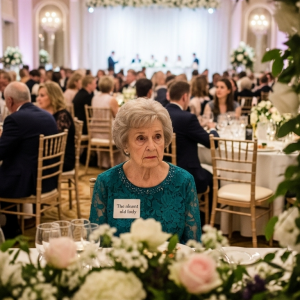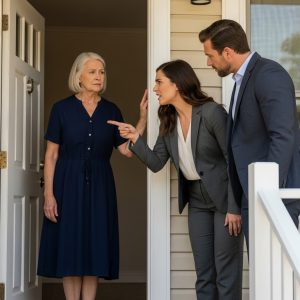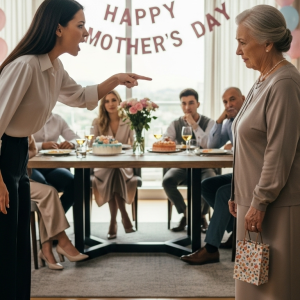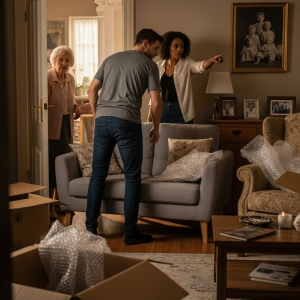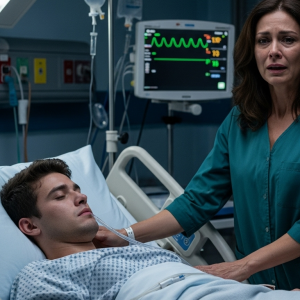The first sign was a tightness in my chest, a persistent pressure that I dismissed as anxiety. My life had become a tapestry woven with the worries of my children. I had spent thirty years making sure they never felt the struggles I did, and in doing so, I had forgotten how to take care of myself.
My days were a constant balancing act of their needs. A call from Melissa, my eldest: “Mom, the landlord is threatening to evict. It’s only for a month, I swear I’ll pay you back.” Then an email from Paige, my youngest, filled with links to suppliers for her online boutique. “I just need a small investment to get the next season’s inventory. This is going to be the big one!”
And then there was Marcus, my son, my boy. He was still “finding his path,” which meant I was still paying for his car insurance and phone bill, reassuring him that it was okay to take his time. I was their safety net, their emergency fund, their unwavering source of support. I worked a demanding job, not for my own retirement, but for their present.
The end came on a Tuesday. I was at home, paying Melissa’s overdue utility bill online, when the pressure in my chest intensified, radiating down my arm. The room tilted, the numbers on the screen swam before my eyes, and the last thing I remember was the sharp, painful crack as my head hit the corner of the desk.
I awoke to the rhythmic, sterile beep of a machine and the harsh fluorescent lights of a hospital room. A kind-faced doctor explained I’d had a serious cardiac event, brought on by what he gently called “prolonged, extreme stress.”
“We’ve contacted your children,” he said, patting my hand. “They’re listed as your emergency contacts. They should be on their way.”
And so I waited. I watched the door, my heart leaping with a painful flutter every time a shadow passed by the small window. Each set of footsteps in the hall was a surge of hope that quickly faded into disappointment.
Hours turned into a day, then two. I called them. Each time, my call went straight to voicemail. I left messages, my voice weak and raspy. “It’s Mom. I’m at St. Mary’s. Please… just call me back.” The silence from their end was a deafening roar in the quiet of my room.
On the third morning, a nurse helped me with my phone, thinking a familiar picture might cheer me up. She opened my social media page for me. And there it was. A new photo, posted by Paige just the day before.
It was my children—Marcus, Melissa, and Paige—all smiling brilliantly, gathered around a picnic table at the lake. My grandson was on Marcus’s shoulders, and Melissa was holding up a plate of deviled eggs—my recipe. The caption felt like a final, fatal blow: “Enjoying a beautiful family day, finally free of all the drama! ❤️”
The drama. I was the drama. My failing heart, my years of sacrifice, my very existence was the drama they were celebrating being free from. I wasn’t just forgotten. I was an obstacle that had been conveniently removed. A cold, profound clarity washed over me. The love I had given so freely had not been returned; it had merely been consumed.
When the calls finally came, they weren’t from my children. They were from debt collectors. My phone, once silent, began to buzz with demands for payments on accounts I didn’t recognize. Confused and weak, the only person I could think to call was my brother, Graham.
He was at the hospital within the hour, his face a storm cloud of anger when he saw me alone, pale and hooked up to machines. “Where are they?” he growled, his voice low and dangerous. “Where are those ungrateful children of yours?”
I just shook my head, the tears I hadn’t been able to shed finally falling. He didn’t need an explanation. He had been watching this train wreck in slow motion for years, a quiet observer of my endless giving.
He took my phone and listened to the voicemails from the collection agencies. He saw the social media post. His face hardened. “This ends now, Sarah,” he said firmly. “You’ve given them your life. You will not let them take what’s left of it.”
He was an accountant, meticulous and fiercely protective. He told me he was going to look into my finances, just to make sure everything was in order. “Let me handle this,” he insisted. “You just focus on getting better.” For the first time in years, I felt like someone was taking care of me.
What Graham uncovered was a betrayal far deeper than I could have ever imagined. It wasn’t just that they had ignored my calls; they had been actively plotting against me.
He found credit cards opened in my name, with thousands of dollars in charges for lavish dinners, designer clothes, and weekend getaways. He found a car loan for a sports car Marcus had bought, with my signature expertly forged on the co-signer line. Paige’s “small investment” for her boutique was a line of credit that had been maxed out and abandoned, leaving me with the bill.
But the most chilling discovery was in a series of emails between them and a lawyer. They had been preparing a petition for emergency conservatorship. They were planning to use my collapse as evidence that I was “mentally and physically unfit” to manage my own affairs. They had letters from my own children, detailing my “anxiety” and “erratic behavior”—all the worries I had confided in them—twisted into a weapon to be used against me.
They didn’t want to help me. They wanted to control everything. My house, my savings, my pension. Everything I had worked my entire life to build, they saw as their inheritance, and they were just waiting for me to be incapacitated enough to take it.
With Graham’s help, I was discharged and went to stay with him. My apartment, once my sanctuary, felt tainted. A week later, I called them to a meeting at my lawyer’s office. They arrived together, a united front, their faces prepared for a negotiation. They thought they still held all the cards.
My lawyer began, but I held up a hand to stop him. This was my battle to finish.
“For three days, I lay in a hospital bed, wondering if I was going to die,” I began, my voice steady and clear. “And you were at a picnic. You were posting photos about being free from drama. My drama.”
Paige started to cry, the same performative tears she’d always used. “We didn’t know it was that serious, Mom…”
“Didn’t you?” I interrupted, sliding a copy of the conservatorship petition across the table. “Because it looks like you were already planning for a future where I was no longer in charge. You weren’t just neglecting me. You were waiting for me to fall so you could pick my pockets clean.”
I laid out the evidence, piece by damning piece. The credit card statements. The forged car loan. The printouts of their self-serving emails. With each new document, the color drained from their faces. Marcus stared at the floor, the picture of a spineless coward. Melissa’s feigned indignation turned to sullen silence.
“The people you hurt are always the ones you think you can’t lose,” I said, looking each of them in the eye. “You were wrong. I am not an inheritance. I am not a bank. I am your mother, and you have failed that relationship at every turn.”
The documents they signed that day were not a negotiation. They were a declaration of independence. My independence. A legal agreement severing all financial ties and a restraining order barring them from my home, my hospital room, and my life.
I walked out of that office and didn’t look back. The pain of it all was immense, a profound amputation of the heart. But for the first time, beneath the pain, I felt something else stirring: peace. It was the quiet, steady peace of a woman who had finally chosen to save herself.
The weeks following the meeting in the lawyer’s office were the quietest of my life. I stayed with Graham, my brother, in his small, tidy home. The silence there was different from the silence of my hospital room. It wasn’t an absence of love, but a protective space, a buffer against the world that had demanded so much from me.
In this newfound peace, the echoes of my old life were deafening. I’d wake up in the middle of the night with my heart pounding, caught in the phantom feeling of an impending phone call, a new crisis demanding my attention. I’d find myself reaching for my phone to share a piece of good news with Melissa or to ask Marcus about his day, only for my hand to stop mid-air as the cold, hard reality crashed down around me again. I was mourning the children I thought I had, not the strangers they had revealed themselves to be.
Graham was my rock. He never told me to “get over it” or to “move on.” He simply sat with me in the quiet, making me tea and ensuring I took my medication. He understood that my grief wasn’t just for a broken relationship, but for the life I had built around a lie. “You spent thirty years being their everything,” he said one evening as we sat on his porch. “It’s going to take time to learn how to be your own.”
The legal fallout was handled with ruthless efficiency by my lawyer. The fraudulent accounts were closed, and investigations were opened. A few of my old friends called, confused. Paige had been feeding them a carefully curated story of a mother in the throes of a tragic mental decline, with a manipulative brother pulling the strings. Calmly, and without emotion, I told them the truth. Some believed me. Some didn’t. That, I was learning, was another casualty of the war: the people who preferred a comfortable lie to a difficult truth.
After a month, Graham gently pushed me to step outside the cocoon of his home. “You gave up your pottery class to pay for Paige’s first failed business,” he reminded me. “And you stopped going to the gardening club when Marcus needed you to bail him out. Maybe it’s time you went back. For you.”
He was right. I felt a tremor of fear at the thought of facing people, of having to explain the wreckage of my family. But the idea of feeling the clay in my hands again, of smelling fresh soil, was a powerful lure. I started with the gardening club.
At first, I was just a quiet observer, keeping to myself. But then a woman named Eleanor, a sharp-witted widow with dirt under her fingernails and laughter in her eyes, sat down beside me. She didn’t ask about my family. She asked about my fight with aphids.
Our friendship bloomed like one of her prize-winning roses. We talked about fertilizer and frost dates, but beneath the surface, we spoke a different language—one of loss, resilience, and the quiet joy of cultivating life after a devastating storm. For the first time, I was building a connection that wasn’t based on need or obligation. It was simply two women sharing a patch of sun. This was my chosen family, and its roots were healthy and strong.
Just as I began to feel a sense of normalcy, the next attack came. It was, predictably, from Paige. And it was public. She launched a massive online fundraising campaign complete with a professionally shot video.
In it, she sat in a softly lit room, tears welling in her eyes, telling the world about her “ailing mother.” She spoke of my “sudden and tragic mental health crisis” following my heart condition. She painted a picture of a confused, vulnerable woman being isolated from her loving children by a “controlling outside influence”—my brother.
The campaign’s goal was to raise funds for my “long-term care and to protect my assets from mismanagement.” It was a masterpiece of manipulation, designed to paint them as devoted children fighting for their mother’s well-being. It was disgusting.
Graham saw it first and called me, his voice shaking with rage. But as I read the words and watched the performance, I felt a strange and liberating detachment. This wasn’t my daughter Paige crying on the screen. It was a stranger, an actress playing a role in a drama I was no longer participating in. They hadn’t learned a thing. Their only response to being held accountable was to double down on the lie.
The old me would have been devastated, humiliated. The new me called my lawyer. We didn’t engage in a public battle. We didn’t comment or post a rebuttal. We fought their lies with cold, hard facts.
My lawyer sent a cease-and-desist letter to the fundraising platform, along with notarized copies of the restraining order, the signed agreement severing financial ties, and a summary of the fraud investigations. He included a note from my doctor confirming my sound mental state and my right to privacy.
The platform shut the fundraiser down within hours, citing fraudulent claims. To counter the local gossip, Graham, with my full permission, gave a single, concise statement to Pastor Eden. “Sarah is safe, healthy, and in full command of her life and her finances. She has the support of those who truly care for her. Any narrative to the contrary is a painful fabrication, and she asks only for peace and privacy as she continues to heal.”
The rumors died down. The whispers stopped. By refusing to engage with their drama, I had taken away their power. Their lies couldn’t survive in the light of simple, verifiable truth.
Months passed. I sold my old apartment, the one filled with too many ghosts, and bought a small, sun-drenched condo with a large balcony perfect for a container garden. I filled it with pots of herbs, tomatoes, and bright, cheerful geraniums. I had my friends from the gardening club over for tea. I went to pottery class twice a week. I was building a life that was smaller, quieter, and entirely my own.
One afternoon, a letter arrived, forwarded from Graham’s house. I recognized the handwriting immediately. It was from Marcus. My hands trembled as I held it, the paper feeling heavy with the weight of everything that had happened. I let it sit on my kitchen counter for a full day before I found the courage to open it.
The letter inside was not what I expected. There were no excuses, no blame, no requests for money or pity. It was just a confession.
“Mom,” it began. “I don’t have the right to call you that anymore, but I don’t know what else to call you. I’ve been in therapy for the last six months. I’m working a construction job, and it’s the hardest I’ve ever worked in my life. I’m paying back every dollar I took, starting with the car loan.
There’s no excuse for what I did. I was weak, and I was a coward. I let Paige and Melissa’s greed become my own. I stood by and watched you sacrifice everything for us, and I convinced myself it was what you were for. When I saw that photo of us at the park, and then when I saw the legal papers, I finally saw myself for what I was. A parasite.
I don’t expect you to forgive me. I don’t think I ever will. I just wanted you to know that I am trying, for the first time, to be a man Dad would have recognized. I hope one day you can heal from the damage I helped cause. I won’t contact you again. This is the only thing I felt I had the right to say.”
I folded the letter and held it to my chest. Forgiveness felt like a distant, impossible shore. But the letter wasn’t another wave trying to pull me back out to sea. It was a message in a bottle, a sign of life from a distant wreck, suggesting that one of my children, somewhere far away from me, had finally begun the long journey toward becoming a decent human being.
I looked out at my balcony garden, at the green shoots pushing their way toward the sun. My future was my own. And that, I knew, was more than enough.
